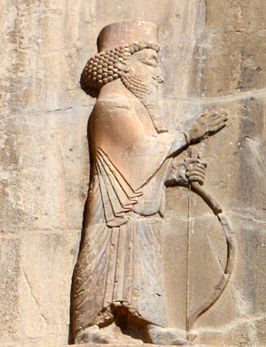Energetic
Persian emperor whose forceful actions to suppress revolt &
centralize authority restored the borders of his far-flung
empire, but whose brutal tactics & harsh treatment of opponents
created conditions for its disintegration after his death.
The fourth son of long-reigning Artaxerxes II (404-358
BCE),
Ochus acted to take control of affairs even before his indolent
aged father died, by instigating the elimination of his older
brothers. On assuming the throne, he adopted his father's throne
name & eliminated more than eighty relatives (both male &
female) whom he saw as potential rivals.
Then turning his attention to
western satrapies that had gotten used to acting independently
in his father's last years, he ordered local governors to
disband their armies & defeated the few in Asia Minor who dared to defy his order.
However, his first attempt to regain Egypt, which his father had
lost to a native dynasty, was thwarted
(350 BCE) & that failure
led other provinces on the Mediterranean rim to rebel. This
so angered Ochus that he returned with a huge imperial army that
destroyed the Phoenician city of Sidon, which had led the
revolt, impaling hundreds of its citizens on javelins even after
their surrender (347 BCE).
Then he led his army south to reconquer Egypt (346
BCE).
When the native pharaoh (Nectanebo II) fled south to Nubia,
Artaxerxes leveled the walls of Egypt's major cities & unleashed his
soldiers to pillage & plunder palaces & temples alike.
His successful
generals were granted control of vast regions that put nominally
autonomous satrapies under centralized control. The naval
commander, Mentor of Rhodes, was granted control of the whole
Mediterranean rim, while the Egyptian eunuch Bagoas was sent to
Babylon, charged with administration of eastern satrapies. The
latter was eventually made chiliarch (grand vizier) of
the whole empire & restored civil order for
half a dozen years.
The emperor's
untimely death, however, jeopardized Bagoas' authority, so he
poisoned the emperor's oldest sons & installed the youngest,
Arses, as his
successor. While the 1st c. BCE
Greco-Roman historian, Diodorus of Sicily, claimed Bagoas
poisoned Ochus himself, Persian records indicate that the latter
had died of natural causes. At any rate, with the death
of Artaxerxes III, Persian power began to fragment & his
subjects' widespread resentment of the brutal tactics which he
used to restore his empire created the conditions for its
collapse in less than a decade.
References: Diodorus Siculus,
Library of History 16.40-52, 17.5.
Arrian,
Anabasis
of Alexander 2.14.
Plutarch,
Parallel Lives: Artaxerxes 26-30.
Justin,
Epitome of Trogus' Philippic History 10.1-3.
Josephus,
Antiquities 11.7.1.
Other resources on
line:


![]()
![]()
![]()
![]() Perspective
on the World of Jesus
Perspective
on the World of Jesus ![]()